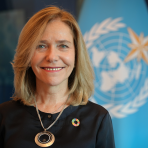UN Climate Summit 2025, Solutions Dialogue on Early Warnings
Convened by: The Secretary-General’s Climate Action Team, WMO, UNDRR, IFRC, ITU, UNEP, Brazil
Excellencies, distinguished guests, colleagues
We are here today for one urgent and unifying purpose: solutions
Solutions that turn science into decisions
Solutions that transform warnings into action
Solutions that build long-term resilience
And Solutions that are based on data sharing and trust
We have good news and can report progress. Quite simply, early warnings are saving lives.
Early Warnings for All is no longer just an initiative. It is a brand – a global movement.
More than 60 percent of countries now report having Multi-Hazard early warning systems.
Least developed countries are making strides and have doubled capacity since official reporting began.
The statistics speak for themselves.
Disaster-related mortality is at least six times lower in countries with good early warning systems.
Just 24 hours notice of a hazardous event can reduce damage by up to 30%.
From 2015-2022, 2.1 billion people were evacuated in advance thanks to early warning systems.
Heat-health action plans are helping us prepare and respond, protecting millions of people all over the world.
But we need to go further, and we need to go faster, especially on extreme heat - the so-called silent killer.
We need to end that silence because the need is urgent.
Temperatures above 4O°C - even above 50°C - are becoming more common.
This affects our health, our water supply, our food chain, our energy and transport systems and our environment.
Every death is one too many.
According to WHO and WMO estimates, scaling up heat health warning systems in just 57 countries could save nearly 100,000 lives every year.
The UN Secretary-General’s call to action on extreme heat has heightened awareness and boosted investment.
Early warnings and heat solutions go hand-in-hand. They are a moral obligation and make economic sense.
WMO is proud to host the Global Heat Health Information Network, bringing together researchers, meteorologists, health practitioners and policymakers.
We have recently joined with WHO to issue science-based guidelines to protect workers.
Additionally, climate science is informing urban planning to cool cities through reflective surfaces, green spaces and more shade.
But we need to break siloes at all levels and across all sectors, to accelerate delivery.
Excellencies, distinguished guests, colleagues,
Moving forward, I propose that we commit to three essential actions:
First, we must scale up financing for early warning systems. This is not a cost but an investment.
Second, we must integrate early warning systems into all Nationally Determined Contributions and national adaptation plans.
Third, we must strengthen cross-sector collaboration to reach the last mile to ensure no one is left behind.
Today we will hear actionable recommendations to accelerate early warnings and heat action ahead of COP30.
On Wednesday, I will have the privilege of reporting the outcomes of this dialogue to the UN Secretary-General’s Climate Summit 2025.
Our findings will help shape the priorities carried forward to COP30.
I look forward to a rich and solutions-driven discussion. Our public and economic health is at stake.
Thank you
Statement by


